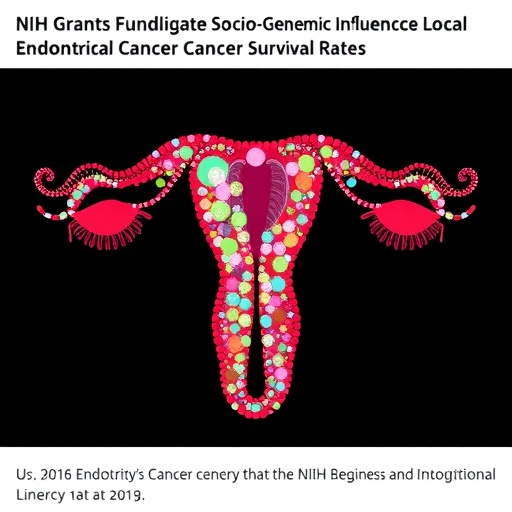
Dr. Anna Gottschlich, an assistant professor at Wayne State University’s School of Medicine and a researcher at the Barbara Ann Karmanos Cancer Institute’s Population Studies and Disparities Research Program, has recently been awarded a prestigious five-year career development grant by the National Cancer Institute (NCI) of the National Institutes of Health (NIH). Valued at $916,545, this award will fund her innovative research focusing on the epidemiology of cancer health disparities, emphasizing early detection and interception strategies aimed at improving cancer equity. This endeavor represents a critical step toward addressing the persistent gaps in cancer outcomes experienced by diverse populations.
The core objective of Dr. Gottschlich’s study, titled “Investigation of socio-genomic associations related to survival among a population-based sample of those diagnosed with endometrial cancer in Metropolitan Detroit,” is to unravel complex interactions between social determinants of health and biological factors that influence patient survival. Endometrial cancer, a gynecologic cancer affecting the uterine lining, presents with notably disparate survival rates among different demographic groups. Despite controlling for known biological and social variables, certain high-risk populations exhibit mortality rates that are double those of their counterparts, signaling the presence of underlying mechanisms yet to be understood.
This research utilizes a socio-genomic framework—a cutting-edge approach combining social epidemiology with molecular biology—to investigate how chronic social stress may biologically modulate cancer progression and survival outcomes. Socio-genomics explores the pathways through which environmental and psychosocial stressors can alter gene expression, immune function, and tumor biology. Dr. Gottschlich hypothesizes that chronic stress is a key modifier in the relationship between molecular subtypes of endometrial cancer and patient survival, proposing that stress-induced biological changes could partly explain racial and socio-economic disparities in mortality.
.adsslot_t27oTsCI1A{width:728px !important;height:90px !important;}
@media(max-width:1199px){ .adsslot_t27oTsCI1A{width:468px !important;height:60px !important;}
}
@media(max-width:767px){ .adsslot_t27oTsCI1A{width:320px !important;height:50px !important;}
}
ADVERTISEMENT
The study population is drawn from the Detroit Research on Cancer Survivors (ROCS) cohort, which is a longitudinal, population-based dataset comprising over 320 women diagnosed with endometrial cancer in the Metropolitan Detroit area. This cohort is particularly valuable due to its comprehensive data collection, which includes detailed annual surveys assessing psychosocial stressors, geocoded residential information, and longitudinal clinical records including vital statistics. The integration of these diverse data streams allows for robust analyses linking neighborhood-level stressors to molecular cancer profiles and survival trajectories.
By leveraging bioinformatics and molecular epidemiology techniques, Dr. Gottschlich’s research aims to delineate specific socio-genomic signatures that correlate with poorer outcomes. These signatures may include alterations in gene expression related to stress-response pathways, immune system modulation, and tumor aggressiveness. Uncovering these profiles could illuminate new biomarkers for early detection of high-risk patients and novel biological targets for therapeutic interventions designed to reduce disparities.
This award not only provides protected time for Dr. Gottschlich to deepen her expertise in molecular cancer epidemiology but also positions her to mentor the next generation of scientists working at the intersection of social health determinants and cancer biology. Her appointment at Wayne State University began recently, in September 2023, marking a significant milestone in her career dedicated to unraveling the biological underpinnings of health inequities.
The research holds transformative potential for public health and clinical oncology practices, especially within urban settings like Detroit, where socioeconomic and racial disparities are pronounced. Chronic stress, often stemming from systemic inequities such as economic deprivation, racial discrimination, and limited healthcare access, could be a mechanistic link escalating biological vulnerability in these populations. By elucidating this link, Dr. Gottschlich’s work underscores the importance of holistic cancer care that integrates social and molecular science.
Furthermore, findings gleaned from this exploratory study will set the stage for future, large-scale R01 grant applications that aim to deepen and expand this line of inquiry. These forthcoming projects could foster interdisciplinary collaborations, combining expertise in epidemiology, molecular biology, bioinformatics, and social sciences to develop comprehensive interventions that address both social and biological determinants of cancer survival.
Experts at Wayne State University, including Vice President for Research & Innovation Dr. Ezemenari M. Obasi, have expressed enthusiasm for the profound impact this project could have on cancer research and population health. Career development awards like this are essential for nurturing emerging leaders in biomedical science, ensuring continued innovation and the advancement of knowledge necessary to tackle complex health challenges.
The significance of this work resonates beyond academic circles. It challenges the traditional paradigms of cancer research by emphasizing the multifaceted interaction of social environments and genomic processes. Such interdisciplinary inquiry is poised to propel the field toward precision medicine approaches that account for social context alongside molecular tumor characteristics.
Detroit’s urban landscape, characterized by diverse demographic groups and varied socio-economic conditions, provides an ideal natural laboratory to study these complex dynamics. The outcomes of this project will offer valuable insights not only for local communities but also for national efforts aimed at reducing cancer health disparities and achieving health equity.
This research initiative embodies the mission of Wayne State University’s health sciences and research programs to address pressing health disparities through rigorous scientific inquiry and community engagement. Through this funding and Dr. Gottschlich’s leadership, a new frontier in understanding and mitigating cancer inequities is emerging—one that bridges molecular science with the social realities influencing patient survival.
Grant number CA303796 funds this vital research. It stands as a testament to the increasing recognition within the NIH of the importance of socio-genomic studies in transforming cancer outcomes and reducing long-standing health disparities affecting underserved populations.
Subject of Research: Epidemiology of cancer health disparities and socio-genomic factors affecting survival in endometrial cancer patients.
Article Title: National Cancer Institute Awards Dr. Anna Gottschlich $916,545 to Investigate Socio-Genomic Influences on Endometrial Cancer Survival
Image Credits: Wayne State University
Keywords: Cancer, Health Disparities, Epidemiology, Endometrial Cancer, Socio-genomics, Molecular Epidemiology, Bioinformatics, Chronic Stress, Cancer Equity
Tags: Dr. Anna Gottschlich research initiativesendometrial cancer disparitiesepidemiology of cancer health disparitiesgynecologic cancers and mortalityhealth equity in cancer outcomesinnovative cancer detection strategiesNational Cancer Institute fundingNIH grants for cancer researchpopulation-based cancer studiessocial determinants of health in cancersocio-genomic influences on cancer survivalsurvival rates in diverse populations





